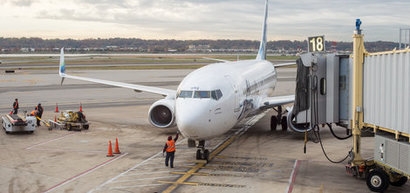
Alternative fuels include biofuel, methanol, ethanol, liquid natural gas, liquid hydrogen, and synthetic fuels. In the past five years, 40,000 commercial flights have taken place from four airports using alternative fuel. However, the industry is facing financial and policy challenges with regard to exploring the use of biofuels further.
One of the major challenges discussed was cost, with jet fuel being by far the biggest cost of any airline which is anywhere between 30-40 percent. With the historic margins for airlines being somewhere around 2 percent airlines will struggle to pay a premium for alternative fuels.
One of the airports leading the way is Geneva Airport, which has committed to introduce sustainable and renewable jet fuel for aircraft operations, with a target of at least one percent of the annual jet fuel consumption starting in late 2018.
We won’t make it an option to take alternative fuels or not” explained Andre Schneider, Chief Executive Officer Geneva Airport. “We have decided we want to add a fixed percentage which will be one percent of alternative fuels delivered. The Airport, with support of the government, will pick up the difference in costs, so the airlines will pay the exact same.”
Jonathon Counsell, Group Head of Sustainability, International Airlines Group (IAG), the sixth biggest carrier in the world, added that the biggest challenge for IAG in the UK is policy and getting the right policy instruments in place.
The panel agreed that stable policies and legislations are key in order to continue to invest in sustainable fuels. According to James Andersen, Business Director, Green Fuels & Chemicals, Honeywell UOP, at the moment, the market is going towards diesel fuels because of the way policies are structured. Financing is also a huge challenge for the development and commercialisation of bio fuels.
“Financing is the hardest part, technology is available, feedstock is too, but it’s putting everything together” said Dr Bruno Miller. “So eventually you need a business case for investment and for that you need private institution to invest. But for that you need a stable policy environment – It’s important that policies for 10-15 years stay the same.”
The panel agreed that industry needs to work in partnership in order to break the industry’s reliance on fossil fuels and cut CO2 emissions in the aviation sector.
The panel included: James Andersen, Business Director, Green Fuels & Chemicals, Honeywell UOP, Jonathon Counsell, Group Head of Sustainability, International Airlines Group
Dr Bruno Muller, Managing Director, Fuels, Fulcrum Bioenergy
Julian Potter, Chief Administrative & Policy Officer, San Francisco International Airport
Andre Schneider, Chief Executive Officer, Geneva Airport
The panel was chaired by Julie Felgar, Senior Advisor, CollaborateUp
For additional information:

